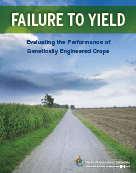|
|
|
|
|
|
|
News & Views item - April 2009 |
![]() Report
from Union of Concerned Scientists Questions Utility of "Engineered Crops".
(April 15, 2009)
Report
from Union of Concerned Scientists Questions Utility of "Engineered Crops".
(April 15, 2009)
 The
Union of Concerned Scientists (UCS) has released a 44 page report,
Failure to Yield: Evaluating the Performance of Genetically
Engineered Crops which sums up its findings: "Despite 20 years of
research and 13 years of commercialization, genetic engineering has failed to
significantly increase U.S. crop yields."
The
Union of Concerned Scientists (UCS) has released a 44 page report,
Failure to Yield: Evaluating the Performance of Genetically
Engineered Crops which sums up its findings: "Despite 20 years of
research and 13 years of commercialization, genetic engineering has failed to
significantly increase U.S. crop yields."
The UCS goes on to say that the report: "...reviewed two dozen academic studies of corn and soybeans, the two primary genetically engineered food and feed crops grown in the United States. Based on those studies, the UCS report concluded that genetically engineering herbicide-tolerant soybeans and herbicide-tolerant corn has not increased yields. Insect-resistant corn, meanwhile, has improved yields only marginally. The increase in yields for both crops over the last 13 years, the report found, was largely due to traditional breeding or improvements in agricultural practices."
And looking to the future the union makes the point: "In addition to evaluating genetic engineering’s record, Failure to Yield considers the technology’s potential role in increasing food production over the next few decades. The report does not discount the possibility of genetic engineering eventually contributing to increase crop yields. It does, however, suggest that it makes little sense to support genetic engineering at the expense of technologies that have proven to substantially increase yields, especially in many developing countries. In addition, recent studies have shown that organic and similar farming methods that minimize the use of pesticides and synthetic fertilizers can more than double crop yields at little cost to poor farmers in such developing regions as Sub-Saharan Africa."
Finally, the report's author, Doug Gurian-Sherman, comments: "If we are going to make headway in combating hunger due to overpopulation and climate change, we will need to increase crop yields . Traditional breeding outperforms genetic engineering hands down."